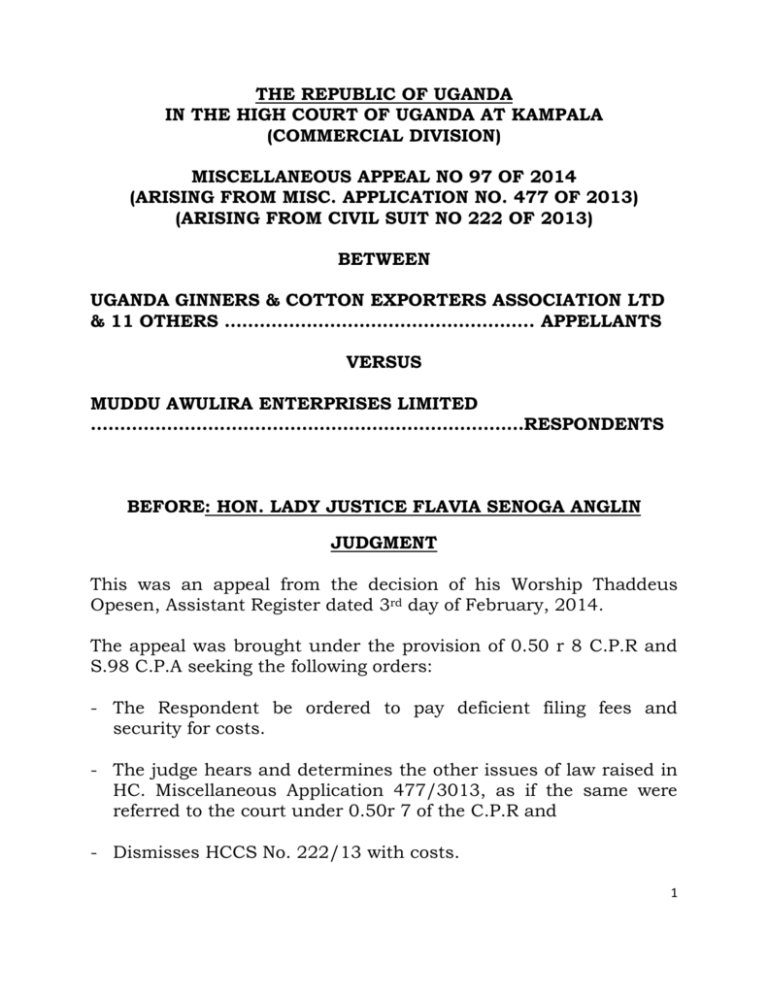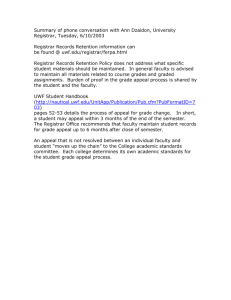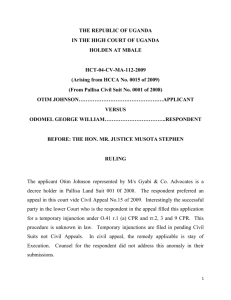Uganda Ginners Cotton Exporters Association Ltd & 11 Ors v
advertisement

THE REPUBLIC OF UGANDA IN THE HIGH COURT OF UGANDA AT KAMPALA (COMMERCIAL DIVISION) MISCELLANEOUS APPEAL NO 97 OF 2014 (ARISING FROM MISC. APPLICATION NO. 477 OF 2013) (ARISING FROM CIVIL SUIT NO 222 OF 2013) BETWEEN UGANDA GINNERS & COTTON EXPORTERS ASSOCIATION LTD & 11 OTHERS …………………………………………….. APPELLANTS VERSUS MUDDU AWULIRA ENTERPRISES LIMITED …………………..……………………………………………RESPONDENTS BEFORE: HON. LADY JUSTICE FLAVIA SENOGA ANGLIN JUDGMENT This was an appeal from the decision of his Worship Thaddeus Opesen, Assistant Register dated 3rd day of February, 2014. The appeal was brought under the provision of 0.50 r 8 C.P.R and S.98 C.P.A seeking the following orders: - The Respondent be ordered to pay deficient filing fees and security for costs. - The judge hears and determines the other issues of law raised in HC. Miscellaneous Application 477/3013, as if the same were referred to the court under 0.50r 7 of the C.P.R and - Dismisses HCCS No. 222/13 with costs. 1 - Costs of the appeal were also applied for. The grounds for the appeal are that: 1) The Registrar erred in law and fact when he failed to properly evaluate the evidence and apply the law and order the Respondent to pay deficient court filing fees. 2) The Registrar erred in law and fact in failing to order the Respondent to deposit security for costs. 3) The Registrar erred in law and fact and failed to properly exercise his discretion and jurisdiction when he failed to find that certain matters of law before him were proper for reference to the judge and to accordingly refer the matters to the judge for determination. The appeal is supported by the affidavit of Dr. John Jean Barya, which was relied upon at the hearing. The appeal is opposed by the affidavit in reply deponed by Peter Allan Musoke. The gist of the grounds for opposing the appeal are that: - The points of law referred to in paragraph 13 of Dr. John Jean Barya’s affidavit in support were not within the scope of the jurisdiction of the Registrar. - The Respondent contested the application for security of costs on the ground among others that, the Applicants did not exhibit the Respondent’s empecuriosity. - Following all the pleadings and arguments, the Registrar dismissed the Appellant’s application for security for costs. - The Registrar in determining the application confined himself to matters that were within his jurisdiction. 2 - The appeal is misconceived and is intended to frustrate the hearing and early determination of HCCCS No. 222/2013, and ought to be dismissed with costs. The following are the issues for court to determine:1) Whether the Registrar failed to properly evaluate the evidence and to apply the law and a result of which the Respondent paid deficient fees. 2) Whether the Registrar erred in law and fact in failing to order the Respondent to deposit security for costs. 3) Whether the Registrar erred in law and fact and failed to properly exercise his discretion and jurisdiction by not finding that some of the matters before him required reference to the judge for determination. The issues will be determined in the order that they are set out. First issue: Alleged failure to properly evaluate evidence and apply the law leading to payment of deficient fee: It is apparent from the pleadings that Respondent sought to recover shs. 2,612,795,040 as special damages. Compound interest of shs. 25% was claimed on the sum from 1999 until payment in full. In determining the sum of fees to be paid, the Registrar did not take the compound interest into account. He based his decision of the sum claimed as special damages. Counsel for the Appellants submitted that the Registrar erred to ignore the claim for compound interest at the rate of 25% (page 9) from 1999 till payment in full. However, it was the assertion of Counsel for the Respondent that, interest prayed for on special damages cannot be included in the value of the subject matter of the suit, as it is awarded at the discretion of the court and may not necessarily be the figure asked for. I must state that I am persuaded by the submissions of Counsel for the Respondent. Under S.26 (2) of the C.P.A the award of either compound or simple interest in absence of agreement between the parties is at the discretion of the trial court. – See the case of 3 Attorney General vs. Virchard Muthalal & Sons CCCA 20/2007. It can only form part of the subject matter of the claim if payable on agreement of the parties. Refer to Sarah Kayaga Farm Ltd vs. Attorney General HCCS 351/91 [2001] HQHC 3, whereas Justice Remmy Kasule (as he then was) cited the case of London, Chatham & Doner Railway Co. vs. South Eastern Railway Co. [1893] AC 429 – 440 (HL). In the present case, there being nothing to indicate that the compound interest claimed by the Respondent was by agreement of the parties or provided for by law, it could not be made part and parcel of the value of the subject matter of the suit. The Registrar was accordingly justified in his decision not to take it into account when determining the fees to be paid. He properly evaluated the evidence before him and correctly applied the law. Before hearing the case, it could not be determined whether the facts justified the award of compound interest. The fees payable were properly assessed and was duly paid by the Respondent and Receipt No. Y110057-5 issued. That was the appropriate fees payable and not shs.61million as Counsel for the Applicant would have court believe. The submissions of Counsel for the Appellant that the suit is not properly before court because insufficient fees were paid is accordingly overruled. - Case of Ndawula vs. Abdul [2007] 2 EA 345 CAU therefore not applicable to the circumstances of the present case. It is true that under S.26 of the Judicature (Court Fees, Fines and Deposits) rules S I 13-3 fees have to be paid and are deemed paid, when paid in full. – See also Lawrence Muwanga Stephen vs. Stephen Kyeyune SCCA12/01 and Namatovu Susan vs. Baguma Augustine CS 1073/2013. And Court has already found in this case that appropriate amount of fees were paid based on the amount claimed in the plaint. It is therefore not acceptable/ true as argued by Counsel for Appellant that, Government will be deprived of revenue. And no justifiable grounds have been proved for this court to order the 4 Respondent to make good the alleged deficiency claimed by the Appellant as there is none. The next issue for court to determine is: whether the Registrar erred in law and fact in failing to order the Respondent to deposit security for costs. Counsel for the Appellants in his submissions only stated that the application for security for costs was dismissed. However, Counsel for the Respondent pointed out that the application disputing costs was grounded in S. 404 Company’s Act and S. 284 Company’s Act. And that the Registrar dismissed application as he found it was not backed any credible testimony. It was emphasized that, in calculation of fees, there were glaring falsehoods and errors of law in arriving at the figures for security. And that security for costs is at the discretion of the court as per the case of Deepak Shah and 3 Others vs. Manuramua Ltd and 2 Others HC MA 361/2000 HCCS 354/2001. And to interfere with the discretion court has to be satisfied that the trial court misdirected itself on some matter and arrived at a wrong decision or failure of justice as a result. – See Banco Arabe Espaniol vs. Bank of Uganda Page 1- 12. Decided cases have established guiding principles to assist court exercise its discretion in determining whether to grant application for security for costs. That is “whether or not looking at the pleadings, the Plaintiff or Respondent’s action shows good prospects of success and or whether the Defendant’s defence might succeed.” – See GM Combined (Ug) Ltd vs. A.K. Detergents (U) Ltd SCCA 34/1995. In the present case, the Appellant based application for security for costs on four preliminary objections, which I will not bother to repeat here. Adding that since the Defendant’s had a good defence to the suit, and that the Respondent would be unable to pay costs and has no known assets within the jurisdiction of court, it was therefore just and equitable that the application be allowed. 5 In his decision, the Registrar found that the preliminary points of law on which the application was partly based were premature and raised in the wrong court. The affidavits in support of the application contained matters not within the knowledge of the deponent thereby affecting the validity of the whole application. And that looking at the evidence of the Applicant, there was nothing to indicate that Respondent would be unable to pay the costs in event of losing the main suit. I have found no reasons to disagree with the decision of the Registrar, more so since courts have emphasized that “… the court must consider the prima facie case of both the Plaintiff and the Defendant. And since trial will not yet have taken place at the stage, an assessment of the merit of the respective cases of the parties can only be based on the pleadings, on the affidavits filed in support or in opposition to the application for security for costs and any other material available at that stage.” I find that the Registrar exercised his discretion correctly and there is no justifiable reason to interfere with his decision. He arrived at the correct decision and there is no failure of justice as a result of the decision. The main ground for application for security for costs was based on an erroneous calculation as to the value of the subject matter. The last issue is: whether the Registrar erred in law and fact and failed to properly exercise his discretion and jurisdiction by failing to find that certain matter of law before him were proper for reference to the judge and to refer them there for determination. Counsel for the Appellant hardly said anything in respect of this ground. However, Counsel for the Respondent pointed out that the issues referred to were not specified and that Counsel had misunderstood the decision of the Registrar. He asserted that the Registrar decided the application on the ground that the affidavit in 6 support of the application was false and therefore the application was incompetent. It was further argued that, Counsel for the Appellant was trying to turn this court in a court of first instance as the rest of the appeal, whereas the matter has already been before court and a ruling given on 02.05.14 concerning the filing of the suit. The suit was allowed to proceed. Emphasizing that all matters on appeal are matters in the suit as court has already ruled, the appeal ought to be rejected and dismissed with costs. It is true as pointed out by Counsel for the Respondent that the points of law referred to by both Counsel in the submissions before the Registrar and referred to here were dealt with and determined in HC Miscellaneous Application 1071/2013 between the parties and the ruling was delivered on 02.05.14. There is therefore no reason why court should again determine the same issues in the current application. As found in the earlier ruling, all the issues are issues in the main suit and shall be dealt with at the hearing of the main suit. The Registrar having found the affidavit in support of the application false and thereby dismissing the application for being incompetent for that reason cannot be said to have erred in exercise of his discretion and jurisdiction. Having found the application incompetent, there was no way he could have referred issues to the judge. A court of law cannot sanction what is illegal. For all the reasons set out herein, I find that the appeal fails and is accordingly dismissed with costs to the Respondent. Flavia Senoga Anglin JUDGE 28.10.14 7





